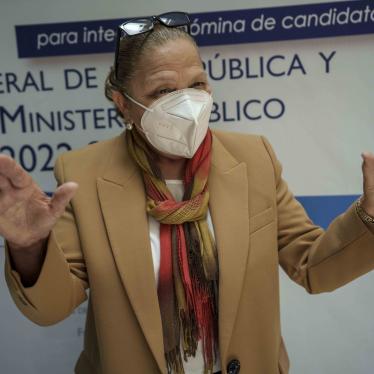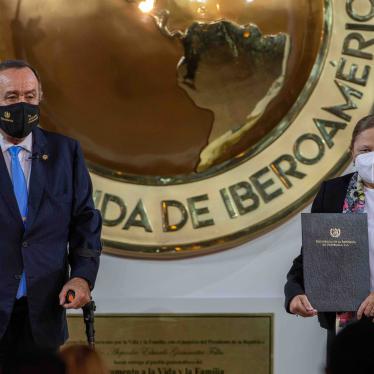(New York) – The appointment of a new comptroller general in Guatemala should be the result of a fair and transparent process, Human Rights Watch said today. The comptroller general plays a key role in preventing corruption and is crucial to ensuring free and fair elections presidential elections in June 2023.
Appointments made earlier in 2022, including of the attorney general and the human rights ombudsperson, were marred by limited transparency and fairness, undermining the separation of powers and human rights guarantees.
“The progressive dismantling of the rule of law in Guatemala casts serious doubts on whether the next presidential elections will be free and fair,” said Juanita Goebertus, Americas director at Human Rights Watch. “International scrutiny over the comptroller’s nomination is key to protecting the country’s democracy and Guatemalans’ right to vote and run for public office.”
On September 21, 2022, Congress swore in a 23-member nominating commission charged with presenting a short list of 6 candidates for comptroller, a position responsible for safeguarding the use of public funds. Congress will appoint the new comptroller from the short list. Current and former officials and other people who have handled public funds who wish to run for public office must obtain a certificate from the comptroller to confirm that they are not under investigation for misuse of public funds.
Previous comptrollers did not issue certificates to several candidates in presidential and local elections, effectively barring them from running.
Guatemalan law requires that the comptroller general be a trained accountant or auditor with at least 10 years of experience, among other eligibility criteria. Guatemalan law also sets a date for the nominating commission to begin its work – in this case, August 13. But delays in the nominating process meant that the commissioners were not able to submit a short list by late September, a deadline also set in the law.
Guatemala’s Supreme Electoral Tribunal will also play an important role in the elections, including by auditing campaign financing and reviewing political parties’ registrations. In 2020, Congress appointed the current five members of the tribunal through a process that lacked transparency and was driven by “political interests,” said Guatemala Visible, a civic group that monitored the process. The committee charged with nominations to fill court vacancies changed its operating rules during the process to allow it to include candidates who would have otherwise been excluded because of their limited academic or professional experience.
President Alejandro Giammattei and Congress have appointed government allies to positions in other key government agencies that were created to be independent from the executive.
On May 16, Giammattei appointed Attorney General Consuelo Porras for a second term, after a selection process marred by limited transparency and independence. During her first four years in office, Porras undermined investigations into corruption and human rights abuses. She has arbitrarily transferred and fired prosecutors, and promoted spurious criminal proceedings against independent judges, prosecutors, and journalists.
On July 20, Congress appointed a new ombudsperson, José Alejandro Cordova. His predecessor, Jordán Rodas, consistently denounced attacks on judicial independence, freedom of expression, and human rights defenders. Congress, which named his successor, repeatedly tried to block the Ombudsperson’s Office’s funding and to remove Rodas because of his support for LGBT rights and other positions he took while in office.
The Congress’ Human Rights Commission, where government allies have a majority, appointed Cordova through a process that lacked transparency. Cordova was implicated in alleged influence peddling during the 2019 selection of judicial nominees to the Supreme Court and Courts of Appeals. Even so, the Commission gave him the highest score of any of the candidates. The Commission has not explained how it calculated the scores nor has it stated whether and to what extent it considered the allegations of influence peddling.
Members of the Comptroller General Nominating Commission should thoroughly evaluate whether each candidate’s proven professional record indicates they would act impartially, and ensure that all shortlisted candidates have proven themselves to be of the highest integrity, Human Rights Watch said.
Concerned governments, including the United States and from Europe, should call for transparency, adherence to established criteria, and respect for the rule of law in the comptroller general selection process, Human Rights Watch said.









